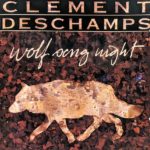
There’s something I truly love about Tim Clément and Kim Deschamp’s Wolfsong Night that I can’t quite pinpoint. Atmospherically, it just puts you somewhere few albums would know how to actually get you there. Perhaps it’s a place many haven’t ventured to visit lately or often enough: the Canadian wilderness. As tied to its location as Hiroshi Yoshimura, Satoshi Ashikawa, and other environmental music proponents were, so to were these unheralded Canadian musical pioneers. On a cold autumn night, Wolf Song’s nocturnal mix of field recordings, languid lap steel pedal guitar, zither, sampler, synthesizer, wolf song, and indigenous chant truly sounds of a sound design you want to luxuriate into or stand beside, marveling at its mystery.
Somewhere, other curious listeners are starting to build a mental picture of special musicians who can sonically capture the locales they come from. Steve Roach’s plane lies in the solitary deserts, plateaus, and landscapes of the American Southwest. Yoshimura-san’s in the forests and streams far from Japan’s industrial sprawl. Philip Glass in the towering skyscrapers, manic human energy, and organized(?) chaos of America. Alquimia‘s was in the sub-tropical airs, spirituality, and ancient patina of Mexico. Here, we have someone (Tim Clément) make a case for the sonic uniqueness of the Canadian topography.

Our focus for this album will be on Tim Clément. Of Métis descent, in northern Quebec Tim grew up realising that music and environment seemed to always be one and the same. Indigenous roots prodded him to value the sanctity of nature and to view it as both a source of influence and one that could be reused creatively. Joining up with fellow simpatico Ontario musician Mychael Danna (back before his more widely known Oscar-worthy soundtrack work), together, they’d collaborate as a duo creating a style of music they’d dub “romantic minimalism”.
Influenced deeply by the ideas of visionary Canadian environmental music composer R. Murray Schafer (who’d later single them out as group creating music as he wishes other would), as a duo they’d take the melodicism of impressionist music and try to combine it with the sound scapes of their natural Canadian environment using newfangled electronic synthesis.
Not exactly New Age or ambient, on ‘80s releases like Another Sun, Summerland, and A Gradual Awakening, they were creating their masterful slice of interior music that had little commonality with the pseudo-spiritual Western style ambient world. At times they sounded like little else out there as they began to integrate traditional Canadiana folk music and Asian/African styles into their heady brew. Somehow, they stumbled onto ideas of creating healing music, ones that derived from R. Murray Schafer’s original work, but also developed from discovery using contemporary technology.
Once the duo informally separated, Tim would decide to go further into the world of healing music. Working under the Chacra Alternative Music record label, a homegrown label for experimental Canadian ambient and New Age musicians, Tim explored just how much further he could localize (and in turn universalize) that original thought. 1990’s thoroughly groundbreaking Waterstation, to this writer’s ear, sounds just as revolutionary as Morgan Fisher’s early ambient work in Japan or as Eno’s “discreet” sonic attunement gleamed via the quietness of his English countryside.
Here, Tim’s music would begin with field recordings, then using traditional Canadian folk instrumentation and a bevy of real and sampled indigenous instruments, expertly blend otherworldly sound environments, coalescing into very evergreen, wild, therapeutic music. Entirely quiet background music this was not.
Out of Waterstation a personal and creative friendship with guitarist Kim Deschamps grew. For Wolfsong Night they explored further the secluded themselves from the increasingly dance-oriented ambient music cropping up in the ‘90s and went into a rediscovery of the Canadian experience. Absorbing the country music of Quebec and mutating it into Tim’s newfound Canadian minimalism.
For many, hearing songs like “Mer Douce”, “Lantern Sky”, or “Waterline” might instantly take them back to that other pioneering work of ambient country-western: Eno’s Apollo (Atmosphere & Soundtracks), specifically “Silver Morning” and “Deep Blue Day”. While that one aims for the spaciousness of space, Wolfsong Night aims for piercing moonlit nights where heavens are lit with borealis wonder.
Foggy music if there ever was one, the atmosphere of Wolfsong Night is never entirely docile. Much like guest musician/Canadian Ian Tamblyn’s own music, ambient country-northern songs like the heavily indigenous-influenced “Pointed Arrows”, “Bear Dance”, “Rivertalk” find us hearing human chant, tribal rhythms, and dark grooves create this murky ambiance that’s beautiful but also slightly dangerous. Songs like “Angels” and “Wolf Song Night” predict the organic neo-folk that neo-folk fails to regularly touch on.
Rather than run away from technology, Tim and Kim exorcise the ghost in the shell conducting instead into some kind of primordial seance — meeting powerful nostalgia we tend to hear in most environmental music, in a very different way. Haunting us, somehow, as we try to pick up the shadows it leaves in its movements. Soft, evasive, it’s a mist of music.
